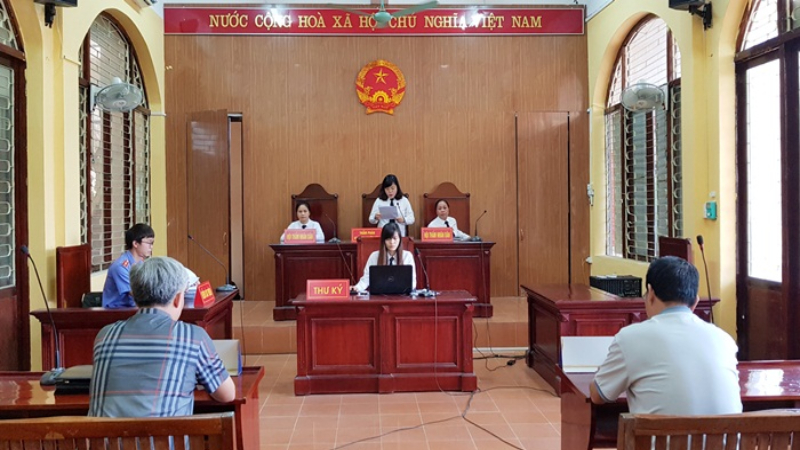What are the cases of joining or separating cases in Vietnam?
What are the regulations on joining or separating cases in Vietnam? - Thuy Lan (HCMC)

What are the cases of joining or separating cases in Vietnam? (Internet image)
Regarding this issue, LawNet would like to answer as follows:
1. What are the cases of joining or separating cases in Vietnam?
According to Article 42 of the Civil Procedure Code 2015, the joining or separating cases is as follows:
- A Court may join two or more cases which it has separately accepted to a single case to resolve if the joinder and resolution in the same case ensure the law compliance.
Regarding cases where multiple persons filing the same petitions for lawsuits against the same individuals or agencies/organizations, the Courts may gather their petitions to resolve in the same cases.
- A Court may separate a case with different claims into two or more cases if the separation and resolution of the separated cases strictly comply with law.
- Upon the case merger or separation prescribed in above, the Courts which have accepted the petitions must issue decisions and send them immediately to the procuracies of the same level, the involved parties and relevant agencies, organizations and individuals.
2. Regulations on transferring civil cases to other courts in Vietnam
Regulations on transferring civil cases to other courts; settlement of disputes over jurisdiction under Article 41 of the Civil Procedure Code 2015 as follows:
- If a Court has accepted a civil case which does not fall within its jurisdiction, it shall issue a decision to transfer the civil cases dossier to a competent Court and cross out the civil cases in its acceptance book.
Such decision must be immediately sent to the Procuracy all involved parties and relevant agencies, organizations and individuals.
The involved parties and relevant agencies, organizations and individuals may make complaints, the Procuracy may submit recommendation for such decision within 03 working days from the day on which the decision is received.
Within 03 working days from the day on which the complaint or the recommendation is received, the Chief Justice of the Court that issued the decision to transfer the civil cases must resolve the complaint/recommendation. The decision of the Chief Justice shall be the final decision.
- Disputes over the jurisdiction of People’s Court of districts in the same province shall be settled by the Chief Justice of the People’s Court of province.
- Any dispute over the jurisdiction between People's Courts of districts of different provinces or between People's Courts of provinces that falls under the territorial jurisdiction of the Collegial People’s Court shall be settled by the Chief Justice of the High People's Court.
- Any dispute over the jurisdiction between People's Courts of districts of different provinces or between People's Courts of provinces that falls under the territorial jurisdiction of different Collegial People’s Courts shall be settled by the Chief Justice of the Supreme People's Court.
3. Involved parties in civil cases in Vietnam
Involved parties in civil cases under Article 68 of the Civil Procedure Code 2015 are as follows:
- The involved parties in civil lawsuits are agencies, organizations and individuals, including the plaintiffs, the defendants and the persons with related interests and obligations.
The involved parties in civil matters are agencies, organizations and individuals, including the persons petitioning settlement of civil matters and persons with related interests and obligations.
- The litigator in a civil lawsuit is the person that initiates lawsuit or the person for whom the other agencies, organizations and individuals prescribed by the Civil Procedure Code 2015 initiates the lawsuit to request the Court to resolve the civil lawsuit when he/she holds that the legitimate rights and interests of that person have been infringed upon.
Agencies and organizations prescribed by the Civil Procedure Code 2015, which initiate civil lawsuits to request Courts to protect the public interests, the State's interests in the domains under their respective charges are also plaintiffs.
- The defendant in a civil lawsuit is the person against whom the plaintiff initiates a lawsuit or the other agencies, organizations and individuals prescribed by the Civil Procedure Code 2015 initiates a lawsuit to request the Court to resolve the civil lawsuit when they holds that the legitimate rights and interests of the plaintiff have been infringed upon by such person.
- The persons with related interests and/or obligations in civil lawsuits are those who neither initiate lawsuits nor are sued, but the resolution of the civil lawsuits is related to their interests and/or obligations and, therefore they themselves, or other involved parties, request to include them in the proceedings in the capacity as the persons with related interests and/or obligations and such requests are accepted by courts.
Where the resolution of a civil lawsuit is related to the interests and/or obligations of a person but no one requests to include him or her in the proceedings in the capacity as the persons with related interests and/or obligations, the Court shall have to include that person in the proceedings in the capacity as the person with related interests and/or obligations.
- The persons petitioning the resolution of civil matters are those who petition the Court to or not to recognize a legal event to form the basis for the arising of rights and/or obligations relating to civil issues, marriage and family, business, trade and labor of themselves or of other agencies, organizations and individuals;
And/or petition the Court to recognize their rights and/or obligations relating to civil issues, marriage and family, business, trade, labor.
- The persons with related interests and/or obligations in civil matters are those who do not petition the resolution of civil matters, but the resolution of the civil matters is related to their interests and/or obligations and, therefore they themselves, or other involved parties in the civil matters, request to include them in the proceedings in the capacity as the persons with related interests and/or obligations and such requests are accepted by the Courts.
Where the resolution of a civil matter is related to the interests and/or obligations of a person but no one requests to include him or her in the proceedings in the capacity as the persons with related interests and/or obligations, the Court shall have to include that person in the proceedings in the capacity as the person with related interests and/or obligations.
- Cases of land rent exemption and reduction under the latest regulations in Vietnam
- Economic infrastructure and social infrastructure system in Thu Duc City, Ho Chi Minh City
- Regulations on ordination with foreign elements in religious organizations in Vietnam
- Increase land compensation prices in Vietnam from January 1, 2026
- Determination of land compensation levels for damage during land requisition process in Vietnam
- Who is permitted to purchase social housing according to latest regulations in Vietnam?
-

- Charges and fees payable in civil cases in Vietnam
- 16:16, 02/03/2023
-

- Vietnam: What is freezing accounts? What are the ...
- 15:36, 09/12/2022
-

- Regulations on settlement of civil cases according ...
- 16:07, 27/10/2022
-

- Notable new policies of Vietnam effective as of ...
- 16:26, 11/04/2025
-
.Medium.png)
- Notable documents of Vietnam in the previous week ...
- 16:21, 11/04/2025
-
.Medium.png)
- Notable documents of Vietnam in the previous week ...
- 16:11, 02/04/2025
-
.Medium.png)
- Notable new policies of Vietnam to be effective ...
- 16:04, 02/04/2025
-
.Medium.png)
- Notable new policies of Vietnam effective from ...
- 14:51, 21/03/2025

 Article table of contents
Article table of contents
